Best Books on PHP Security Techniques to Buy in February 2026
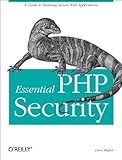
Essential PHP Security


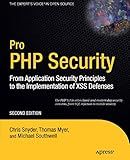
Pro PHP Security: From Application Security Principles to the Implementation of XSS Defenses (Expert's Voice in Open Source)


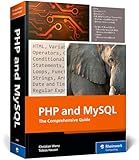
PHP and MySQL: The Comprehensive Guide to Server-Side Web Development with PHP 8 – Build Dynamic Websites with Database Integration, Security, and More (Rheinwerk Computing)


![Security Principles for PHP Applications: A php[architect] guide](https://cdn.blogweb.me/1/51r_P_Pk_Uqh_RL_SL_160_f81cd10c8a.jpg)
Security Principles for PHP Applications: A php[architect] guide
![Security Principles for PHP Applications: A php[architect] guide](https://cdn.flashpost.app/flashpost-banner/brands/amazon.png)
![Security Principles for PHP Applications: A php[architect] guide](https://cdn.flashpost.app/flashpost-banner/brands/amazon_dark.png)
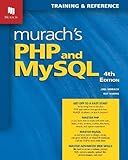
Murach's PHP and MySQL (4th Edition) Professional Web Development Guide for Learning PHP & MySQL Database Programming - Beginner-Friendly Coding Book with MVC Pattern & Security Features


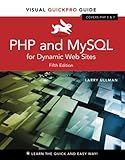
PHP and MySQL for Dynamic Web Sites: Visual QuickPro Guide


To set an HttpOnly cookie in PHP, you can use the setcookie() function with the httponly parameter. Here's an example:
setcookie("cookie_name", "cookie_value", time()+3600, "/", "", true, true);
Let's break down the parameters:
- cookie_name: Provide a name for your cookie.
- cookie_value: This specifies the value you want to assign to the cookie.
- time()+3600: Set the expiration time for the cookie. In this example, it is set to expire in one hour. You can adjust the time according to your needs.
- /: This specifies the path on the server where the cookie will be available. Setting it to "/" makes it available across the entire domain.
- "": This parameter represents the domain where the cookie is valid. An empty string means it will be valid for the whole domain.
- true: The secure parameter, if set to true, ensures that the cookie will only be sent through an encrypted HTTPS connection.
- true: Finally, the httponly parameter, when set to true, makes the cookie accessible only through HTTP and prevents client-side scripts from accessing it.
Setting httponly to true adds an extra layer of security by mitigating potential cross-site scripting (XSS) attacks.
How does an HTTP-only cookie prevent cross-site scripting (XSS) attacks?
An HTTP-only cookie provides a method to mitigate cross-site scripting (XSS) attacks by preventing client-side scripts from accessing the cookie through the document.cookie property in JavaScript.
In a typical XSS attack, an attacker injects malicious code into a website, which is then executed by unsuspecting users' browsers. This code can attempt to steal sensitive information, such as cookies, from the user. However, when a cookie is flagged as HTTP-only, it cannot be accessed or modified by client-side code.
By design, the HTTP-only flag is set during the creation of the cookie using the HttpOnly attribute. This attribute restricts the cookie to be sent only via HTTP or HTTPS requests and disallows it from being accessed by JavaScript code. Therefore, even if an attacker successfully injects malicious scripts into a page, they won't be able to read or tamper with HTTP-only cookies.
HTTP-only cookies provide an additional layer of security against XSS attacks, making it harder for attackers to steal sensitive information and perform session hijacking. Nonetheless, it's important to note that HTTP-only cookies alone do not eradicate XSS vulnerabilities completely. Implementing other security measures, such as input validation and output encoding, is crucial to ensure comprehensive protection against XSS attacks.
Why would you want to use an HTTP-only cookie in PHP?
There are several reasons why you might want to use an HTTP-only cookie in PHP:
- Enhanced Security: HTTP-only cookies cannot be accessed or modified by client-side scripts, such as JavaScript. This helps protect against attacks like Cross-Site Scripting (XSS), where an attacker tries to inject malicious scripts into web pages.
- Mitigating Session Hijacking: HTTP-only cookies are primarily used for session management. By setting the session cookie as HTTP-only, you reduce the risk of session hijacking, where an attacker tries to steal a user's session data and impersonate them.
- Compliance with Security Guidelines: Many security guidelines, such as the OWASP Top Ten, recommend using HTTP-only cookies to enhance the security of your web application. Following these guidelines helps ensure that your application meets industry best practices.
- Preventing Information Leakage: By restricting access to cookies, you can prevent sensitive information stored in cookies from being exposed to potential attackers. This is particularly important for cookies that contain authentication tokens or other sensitive data.
It's important to note that while HTTP-only cookies provide added security, they are not a silver bullet. It's still crucial to take other security measures, such as using secure HTTP (HTTPS), properly validating and sanitizing user inputs, and implementing other security controls, to ensure the overall security of your PHP application.
Can you retrieve the value of an HTTP-only cookie using PHP?
No, PHP cannot directly retrieve the value of an HTTP-only cookie. This is because HTTP-only cookies are designed to be inaccessible to client-side scripting languages like JavaScript and PHP. They can only be accessed and used by the browser during the HTTP requests and responses.
However, PHP can still work with HTTP-only cookies by including them in the HTTP request headers automatically. The browser will handle sending the cookie to the server, and PHP can then access it using the $_COOKIE superglobal variable along with the other non-HTTP-only cookies.
What is the difference between a session cookie and an HTTP-only cookie?
A session cookie and an HTTP-only cookie are both types of cookies used in web applications, but they have some key differences:
- Definition: Session Cookie: It is a type of cookie that is stored temporarily on the user's device during a browsing session and is deleted once the session ends or the browser is closed. HTTP-only Cookie: It is a type of cookie that can only be accessed and transmitted by the web server over an HTTP or HTTPS connection. It cannot be accessed by client-side scripts or JavaScript, providing an additional layer of security against cross-site scripting (XSS) attacks.
- Purpose: Session Cookie: It is primarily used to maintain session state and track user activities within a website. It helps remember user preferences, login details, shopping cart contents, etc., during a specific browsing session. HTTP-only Cookie: It is used for secure transmission and storage of sensitive information, such as authentication tokens, session IDs, or other confidential data. It prevents client-side scripts from accessing or modifying the cookie, reducing the risk of XSS attacks.
- Accessibility: Session Cookie: It can be accessed by both client-side scripts (e.g., JavaScript) and server-side scripts. This makes it possible to manipulate or read the cookie values using scripting languages. HTTP-only Cookie: It can only be accessed by the web server. It is excluded from client-side scripts, making it more secure against unauthorized access or tampering.
- Security: Session Cookie: It is generally less secure compared to HTTP-only cookies as it can be susceptible to XSS attacks if proper precautions are not taken. HTTP-only Cookie: It enhances security by preventing client-side scripts from accessing the cookie data. This makes it harder for attackers to steal sensitive information or perform malicious actions using XSS attacks.
In summary, while session cookies are used for maintaining user-specific state within a browsing session, HTTP-only cookies provide an extra layer of security by restricting access to the cookie data only to the web server.
What happens if a user's browser doesn't support HTTP-only cookies?
If a user's browser doesn't support HTTP-only cookies, it means that the browser is unable to enforce the HTTP-only flag on cookies. HTTP-only cookies are designed to prevent attacks such as cross-site scripting (XSS) by restricting access to cookies only through HTTP or HTTPS protocols.
In the absence of HTTP-only cookie support, the browser may allow access to cookies from client-side scripts and other non-HTTP protocols. This can make the web application more vulnerable to attacks as malicious scripts can potentially access and manipulate these cookies.
Without HTTP-only cookies, attackers may exploit vulnerabilities like cross-site scripting (XSS) to steal sensitive information from cookies, such as session identifiers or user credentials. This can result in session hijacking, identity theft, and unauthorized access to user accounts.
To mitigate these security risks in browsers that do not support HTTP-only cookies, web developers should employ other security measures such as implementing proper input validation, output encoding, and secure coding practices to prevent cross-site scripting attacks. Additionally, developers should consider alternative methods of protecting sensitive data, such as storing session identifiers in encrypted tokens or using additional security mechanisms like token-based authentication.
How do you retrieve the expiration date of an HTTP-only cookie in PHP?
In PHP, you can retrieve the expiration date of an HTTP-only cookie using the $_COOKIE superglobal array. However, HTTP-only cookies are not accessible through this array directly. Instead, you can use the header() function to send an HTTP request that contains the cookie, and then extract the expiration date from the response headers.
Here's a step-by-step guide on how you can retrieve the expiration date of an HTTP-only cookie in PHP:
- Start by enabling output buffering using the ob_start() function. Output buffering is necessary to capture the response headers.
ob_start();
- Send an HTTP request to a specific URL or the same page using the header() function. In the request header, you can include the HTTP-only cookie you want to retrieve the expiration date for.
header("GET / HTTP/1.1"); header("Host: example.com"); header("Cookie: cookie_name=cookie_value;"); // Include the HTTP-only cookie in the request
- Capture the response headers using the ob_get_clean() function. This function collects the contents of the output buffer and turns off output buffering.
$response = ob_get_clean();
- Extract the expiration date from the response headers. Locate the Set-Cookie header corresponding to the cookie you want to retrieve the expiration date for. The expiration date is usually specified in the cookie string. You can use regular expressions or string manipulation functions to extract the expiration date.
For example, assuming the Set-Cookie header contains the expiration date in the format expires=YYYY-MM-DD HH:MM:SS, you can extract it using the following code:
preg_match("/expires=([^;]+)/", $response, $matches); $expirationDate = $matches[1];
Note: The specific implementation may vary depending on the structure and format of the response headers. Make sure to handle error cases and adjust the regular expressions or string manipulation accordingly.
With these steps, you can retrieve the expiration date of an HTTP-only cookie in PHP.
Can you set an HTTP-only cookie to expire in the past?
No, it is not possible to set an HTTP-only cookie to expire in the past. The expiration time of a cookie is typically specified as a future timestamp, and once the expiration time is reached, the cookie will be automatically deleted by the browser. Setting a cookie to expire in the past would not make any sense and would have no practical purpose.
